Big Trouble for BBC in India: How the media outlet violated foreign exchange rules
First came the tax surveys, now the Enforcement Directorate has filed a case against BBC India for alleged foreign exchange violations. Emails, accessed exclusively by Firstpost, show that the broadcaster was aware of the change in rules introduced in 2019 but did little about it

A hoarding of broadcaster BBC installed along the roadside in Mumbai. The ED has registered a case against BBC India under the Foreign Exchange Management Act (FEMA) for alleged foreign exchange violations. File photo/AFP
Trouble for the British Broadcasting Corporation (BBC) continues in India. In February, tax “surveys” were conducted at the broadcaster’s offices in Delhi and Mumbai. Now, BBC India is under the scanner for alleged foreign exchange violations. The Enforcement Directorate (ED), which is tasked with fighting financial crimes in India, has registered a case against it under Foreign Exchange Management Act (FEMA).
What is the latest case against BBC India?
Two weeks ago, the ED registered a case against BBC India for alleged foreign exchange violations. The investigation is based on findings of the tax department’s three-day survey at the BBC India offices in February.
The central agency has reportedly questioned six employees, including one of the directors of BBC India.
The ED has called for documents and is recording statements of some BBC executives under the provisions of FEMA, according to a report by The Indian Express.
The inquiries conducted so far suggest “prima facie violation of the provisions of the Foreign Exchange Management Act, 1999 and its rules and regulations namely Foreign Exchange Management (Non-Debt Instruments) Rules, 2019 and other regulations prior to that; which regulate the receipt of Foreign Direct Investment”.
Where has BBC India faltered?
In September 2019, the Indian government capped FDI in digital media at 26 per cent and issued a clarification the next October, which specified which entities were required to comply. The Information and Broadcasting Ministry reinforced this in November 2020 asking “entities involved in uploading/streaming of news and current affairs through digital media” to comply with the decision.
This means that a foreign investor cannot have more than a 26 per cent stake in a digital media entity.
“One of the companies of the BBC group was aware about the aforesaid FDI violations. However, they intentionally avoided taking any action regarding the same FDI rules,” according to an ED note accessed by CNN-News18.
The company at the centre of the controversy is BBC World Service India Private Limited, the subsidiary of the British broadcaster in the country. The parent company is called BBC World Service.
The Indian subsidiary is reportedly 100 per cent owned by the parent firm with no other investor. So when the new rules were introduced, the company was expected to make changes to its structure to comply with the law. However, it failed to act.
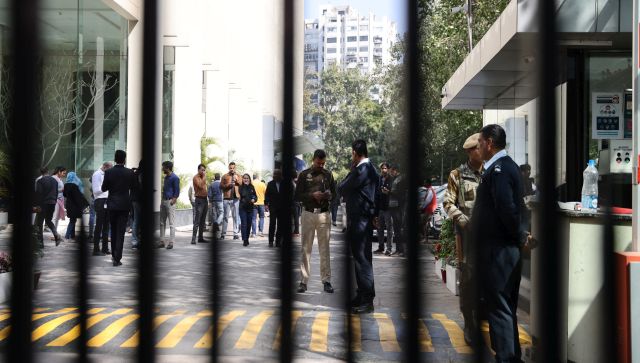
What did BBC do after the rules changed?
The BBC was concerned, shared emails and had wide-ranging discussions about the alleged violation. Firstpost has exclusive access to emails exchanged by BBC officials, which were later deleted by them. However, Indian authorities have retrieved them.
Firstpost broke the news about the emails on its show Vantage, hosted by executive editor Palki Sharma on Thursday, 9 pm. Here’s what the never-been-seen-before documents revealed.
Also read: Government licensed extortion? ‘Secret’ model that funds the BBC
What do the BBC emails reveal?
In the emails, BBC executives talked about the risk of violating Indian laws. The first one was sent by Chris Loweth, the director of legal and rights at BBC International News Services, on 22 August 2022. He wrote to his colleagues that the BBC was yet to comply with the new Indian policies, according to the report on Vantage.
“We are already well past the deadline for complying with the policy. We haven’t been contacted by any government agency suggesting we’re not compliant yet, so there is no deadline in that sense,” Loweth reportedly wrote.
“But we need to be able to demonstrate – both to EY and potentially to the Indian government if contacted – that we’re serious about evaluating the options and then implementing whatever recommendation results,” he added.
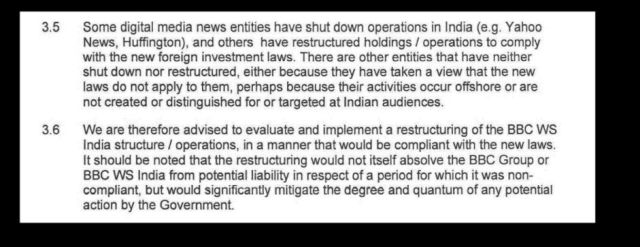
Firstpost has exclusive access to another email from August 2022, which was labelled confidential and titled “BBC World Service India: Ownership and Control”. This document, assessing the restructuring of the BBC in India, reads, “The Indian Government has introduced new rules on the level of foreign ownership of digital media news entities. BBC World Service India has been advised to evaluate and implement a restructuring of its structure and operations in India, in a manner that would be compliant with the new laws. A range of options have been identified, each of which involves significant changes to the BBC’s ownership and control of its news activities in India.”
The email further said that “legal advice provided in December 2020 was that since news and current affairs content at the time was being uploaded to YouTube channels by BBC WS [World Service] India, BBC WS India was likely to be viewed as a ‘digital media entity’”.
The confidential document also pointed to digital news entities like Yahoo News and Huffington Post, who had shut down operations in India after the change in FDI rules, and others who had restructured operations to comply with new foreign investment laws.
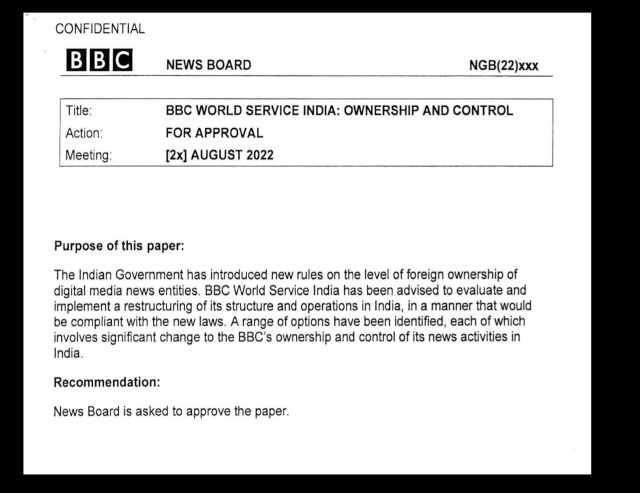
But despite the exchanges, three years after the law was introduced, the BBC did not make any changes to its holdings. Instead, it adopted a “wait and see policy”, the emails accessed by Firstpost revealed. “Given the uncertainty over whether the policy was intended to apply to publishers such as the BBC, a ‘wait and watch policy’ was adopted to see whether and how other publishers responded to the new rules,” the second document said.
So the BBC chose not to make the required changes and reportedly tried to delete the emails when the company came under scrutiny. The email exchanges have now been retrieved by Indian agencies, sources told Firstpost.
What has the BBC said?
After news broke of the alleged violations on Thursday, the BBC said that it would fully cooperate with the Indian authorities.
A spokesperson for the British media corporation told PTI that the BBC would comply with its obligations for operating in India. “We will continue to cooperate fully with the Indian authorities to ensure that we comply with all our obligations,” a BBC spokesperson said.
The ED probe comes following the IT department’s survey operations at the BBC offices in India in February.
In its statement following the action, the Central Board of Direct Taxes (CBDT) said it had found discrepancies and that the income and profits disclosed by the organisation’s units were “not commensurate with the scale of operations in India”.
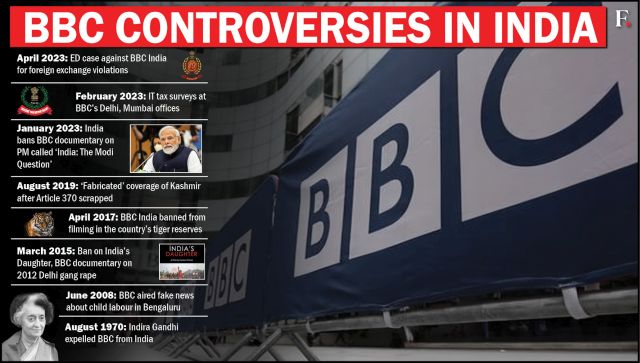
The tax surveys came after the BBC had on 17 Janaury released a controversial documentary on the 2002 Gujarat riots titled India: The Modi Question. Prime Minister Narendra Modi was the chief minister of the state when the riots took place. On 20 January, the Centre ordered YouTube and Twitter to take down links sharing the film, which officials said, undermined “the sovereignty and integrity of India.”
The Opposition questioned the timing of the surveys, calling it a tactic of intimidation after the release of the documentary.
Back then, the British government had defended the BBC and its editorial freedom in Parliament, saying, “We stand up for the BBC. We fund the BBC. We think the BBC World Service is vital.”
But the troubles of the broadcaster are far from over. It continues to hit headlines in India for all the wrong reasons. The BBC will have to face the enforcement agencies in the country and prove its legal status or else face the prospect of winding down operations.
With inputs from agencies
Read all the Latest News, Trending News, Cricket News, Bollywood News,
India News and Entertainment News here. Follow us on Facebook, Twitter and Instagram.
also read

'Inspired every Indian': PM Modi on Prez Murmu taking sortie on Su-30 fighter jet
On Saturday, President Murmu took a sortie on the Sukhoi-30 MKI fighter jet at Assam's Tezpur Air Force Station
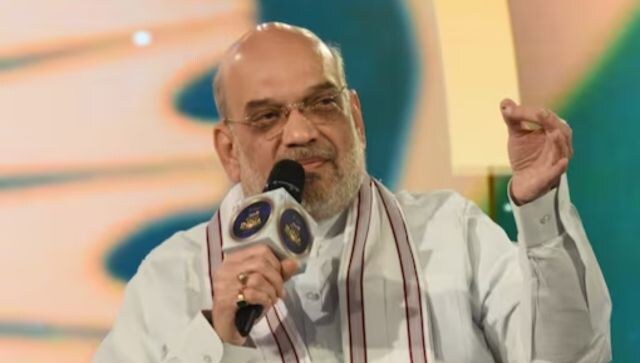
Rising India: Amit Shah drops ‘Frame Modi’ bombshell, questions intentions of top Congress leaders | Full Interview
From setting the record straight on Rahul Gandhi’s disqualification from Parliament to busting the myth of ‘opposition unity’ ahead of 2024 Lok Sabha elections, Union home minister Amit Shah shared his views on a host of issues in a candid interview at the Rising India Summit 2023
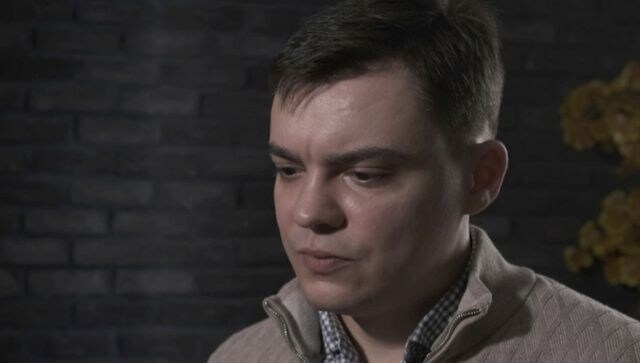
Is Vladimir Putin afraid of dying? Is he seriously ill? Shocking revelations by Russian defector
Vladimir Putin is no longer the macho leader he once portrayed to be, if Russian defector Gleb Karakulov is to be believed. The intelligence officer, who has travelled extensively with the president, said that he was ‘pathologically afraid for his life’. He never uses mobile phones or the internet
